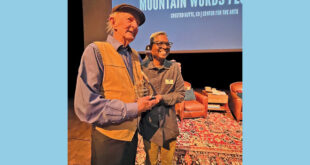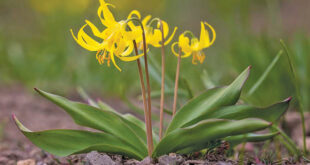By Dawne Belloise
This Appalachian mountain woman is now a local who is helping other outdoorsy women answer nature’s call a lot easier. She’s taken a college side hustle, patented her concept and went on to make it her full-time career. Georgia started her women’s outdoor clothing line, called Gnara, in the last semester of her senior college year. Her company patented a zipper technology so women can relieve themselves outside without dropping trouser.
Georgia grew up in the Appalachian mountains of western Maryland in Frostburg. “It’s a part of the country no one knows about,” she smiles and says that her hometown is similar to Gunnison. “It’s a college town with about 9,000 people.” However, the area is very impoverished “and not a lot of emphasis is on higher education. As with traditional, conservative Appalachian towns, where a lot of families have multiple generations, if you don’t have multiple generations of family living there, you’re considered an outsider,” Georgia tells. “What I find refreshing about rural western towns is that almost everyone’s a newcomer and there’s a lot more movement of people and ideas, it’s less stagnant, less entrenched in a certain way.”
Similar to Crested Butte, Frostburg was, and still is, a coal mining town. “Our whole backyard was a reclaimed mining field that was no longer active but had grass growing on top of it,” but she adds that her town is also “absolutely beautiful.”
As a kid, she spent a lot of time outdoors. ”The Great Allegheny Passage is a rails-to-trails gravel riding bike path,” which are common on the east coast, she says. “We lived in a great neighborhood and had the world’s best sledding hill, almost a mile downhill through our backyard, a field, then a forest. We often joked that we needed a lift because the walk back up was so long.”
She played in the local recreation leagues for sports – soccer, basketball and softball – and her dad was their coach. “It was part of his big decision to take a job at Frostburg State University as a professor of clinical psychology, because before he’d been teaching at Harvard and Dartmouth.” Georgia’s high school was small but it was also a feeder for kids from other towns all over western Maryland and she feels that the cool thing about growing up in a rural town was the opportunity for every student to participate in every sport and activity. “I was a three-sport varsity athlete, in student government, school musicals and a dozen different clubs.” She graduated in 2014 and her only thought was to “get the heck out of there.”
Georgia was interested in opportunities that would allow her to travel the world. She applied to 18 different colleges to ensure she could get away from Frostburg. “I was worried that I wouldn’t get in anywhere because it’s so competitive outside of Appalachia,” but she was accepted at Middlebury College in Vermont, which also happened to be the farthest college away from home that she applied to without having to fly back to see family. It also just happened to offer the best financial aid package.
Georgia started out with a pre-med curriculum but wasn’t certain that she wanted to dedicate the next eight years of her life to it so she switched to International Politics and Economics with a minor in Global Health. “I chose it because it was two subjects that I had never been exposed to prior and I think that politics and economics explain how most things in the world work and it all comes down to money and beliefs system,” she felt that it would allow the most opportunities as well. She graduated in 2018, and received a Fulbright Fellowship which took her to Turnov, a medieval village in the Czech Republic.
Fulfilling her dream to see the world, Georgia had also studied abroad for several semesters in several countries, including Cuba, and then took an unlicensed health internship in Santiago, Chile. She also took a class in Ethiopia. She traveled to Haiti, where she taught at a school and did community work. “I went from not having left the country before college to having lived, worked, studied in and traveled to 25 different countries by the time I was 25. I think when you grow up sheltered it can make you really hungry for as many experiences as you can get your hands on.”
In Turnov, Georgia taught English at a business academy to students who were going into business, hospitality and tourism. Most of the students were local or regional who needed a high school level fluency. A year later, in the fall of 2019, she was hired in Boston as an economic consultant for mostly health and pharmaceutical cases as well as intellectual property litigations. “The job was an intersection of law, politics, economics and public health and business. Every day was different and it taught me some harder skills that I didn’t get from a liberal arts education, like statistical coding.” Because of COVID, Georgia laughs that she went from working on the 18th floor of a glass skyscraper to working from bed.
Throughout all Georgia’s traveling, college and work, her company Gnara was developing into a reality. The idea was born of necessity when she was working a summer job as a glacier guide in Alaska. “I was working 8 to 12 hours a day on the ice on the Menden Hall Glacier. It’s known for its really beautiful blue color that appears more vibrant than other glaciers. My daily commute was biking 10 miles, get to the airport, change into glacier clothes, take a helicopter to base camp and then be there for the next 2 hours giving walking tours. Usually, I was the only woman in comparison to the male guides,” and she notes that those boys had the advantage of being able to easily just unzip and go anywhere. “I found myself having to trek across the glacier, carefully avoiding crevasses, until I could find a spot with enough privacy, completely remove 3 to 4 layers in freezing temps, do my thing and put it all back on and hike back to work. That process was such waste of time and energy and left me cold for hours.” It was such a hassle that she’d purposely not drink liquids, risking dehydration.
She knew there had to be a better way, so after working the design, she patented the technology as GoFly, which is a second zipper that starts at the base of a traditional fly and extends all the way to the back waistband, “We were the first to invent a functionality to work in this way and on this scale.” Most of the sales are from her website Gnara.com, but also through large and small retail stores across the U.S. and New Zealand. Local retailers Chopwood Mercantile and Treads and Threads in Gunnison and CB also carry the brand. “The idea has always been to make this design the norm in bottoms or pants across industries and genders, so we’re licensing across as many applications as possible. Our first licensing hit the market last month with Livsn Designs, primarily a men’s outdoor lifestyle apparel that wanted to break into the women’s market. Business has taken off with over 20,000 units of clothing being sold around the world and we’re patented in over 30 countries.”
Gnara received a boost from the Western Colorado University ICELab that offers programs and resources to support businesses and start-ups, “We got into Moosejaw Mountaineering Outdoor Industry Accelerator. We were one of four companies chosen to come to Gunnison for two months during the accelerator. We got a $50,000 purchase order from Moosejaw, which is the second largest outdoor retailer next to REI. It helped us with the production run.”
Georgia says she was always planning to move to Colorado. “After living in the epicenter of COVID in Boston, I was ready to be out of the city. I had been to Boulder and Denver. I did not know the Western Slope existed. When a room opened up in the valley, I had 48 hours to decide whether or not to take it. With the housing crisis, I decided to take it after the accelerator.” She moved here in July of 2021.
“Of all the places I’ve traveled, this is right up there with the most beautiful of places. Owning an outdoor apparel company, it’s the ideal place to do a variety of product testing. Also, working a really stressful job, the closest resemblance to a work life balance is the outdoor access I can get is here,” she says. Georgia smiles that from the floors of her college dorm room to the floors of the largest retailers in North America, “It’s been a wild ride.”
 The Crested Butte News Serving the Gunnison Valley since 1999
The Crested Butte News Serving the Gunnison Valley since 1999





